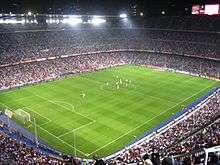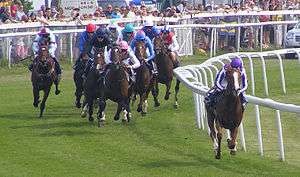Sport in Europe
Sport in Europe tends to be highly organized with many sports having professional leagues. The origins of many of the world's most popular sports today lie in the codification of many traditional games, especially in Great Britain.
Team sports
Association football

Association football (also known as soccer) is the most popular sport in almost all European countries. European national teams have won 11 of 20 editions of the FIFA World Cup. They also compete in the UEFA European Championship since 1960. UEFA, the regional governing body, also organizes the UEFA Women's Championship since 1984.
The most popular and successful football leagues are the Spanish La Liga, the English Premier League, the Italian Serie A and the German Bundesliga.[1] The top clubs in each league play the UEFA Champions League.
Rugby union
.jpg)
Rugby union is popular in southern France, southern England, Wales, Scotland, Ireland and northern Italy. Although the game is played competitively in Germany, Russia, Romania and Georgia, it is not at a fully professional level.
Europe's main competition for national teams is the Six Nations Championship, first held in 1883 as the Home Nations Championship. The England national teams is the only European team to have won the Rugby World Cup, whereas France was runner-up three times and Wales reach the semifinals once.
The three main domestic rugby union competitions are the fully professional Premiership (England), Top 14 (France) and Pro12 (Ireland, Scotland, Wales and Italy). The European Rugby Champions Cup is the continental championship, with clubs qualifying from the three professional competitions.
Rugby league
Rugby league is popular in northern England, where the sport formed in 1895. The game is also popular in southern France.
The Great Britain national team first played in 1908, and entered the World Cup until 1992 and the Tri-Nations until 2006. England, Scotland and Wales have played independently since then. Great Britain has won the World Cup three times, whereas France has been runner-up twice..
Clubs from England and France compete in Europe's only fully professional league, the Super League, as well as the Challenge Cup competition.
In addition to this, the game is also played semi-professionally and at amateur levels in Russia, Serbia, Italy, Wales, Scotland and Ireland.
Cricket
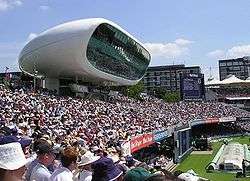
Cricket is a popular summer sport in the United Kingdom and has been exported to other parts of the former British Empire. Cricket has its origins in south east Britain. It is popular throughout England and Wales, and parts of the Netherlands. Cricket is also popular in other areas and also played in northwest Europe. It is however very popular worldwide, especially in southern Africa, Australia, New Zealand and the Indian subcontinent.
The England cricket team is the only European team with Test status. Their main rival is Australia, and they play each other in The Ashes series.
Ice hockey
_(9783568966).jpg)
Ice hockey is very popular at a professional and amateur level in Czech Republic, Slovakia, Russia, Norway, Sweden, Finland, Latvia, and northern central Europe, where it rivals association football in popularity. It is also popular at a professional level in Germany, Austria, Switzerland, most of Western Europe and parts of former USSR and Yugoslavia.
The Kontinental Hockey League originated from Russia but currently features teams from eight other countries. The Austrian Hockey League, Czech Extraliga, Deutsche Eishockey Liga, SM-Liiga, National League A and Swedish Hockey League are other professional leagues, whote top team meet at the Champions Hockey League.
The Ice Hockey European Championships for national teams was played from 1910 to 1932. National teams currently play the Ice Hockey World Championships, where Russia / Soviet Union have claimed a combined 27 titles, the Czech Republic / Czechoslovakia 12 and Sweden 9.
Basketball
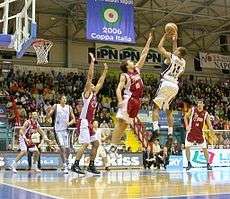
Basketball originated in America. It was invented by James Naismith in Massachusetts. He first coached Kansas University, and is their only coach with a career losing record.
The EuroBasket is the main European basketball competition for men's national teams, first held in 1935. The Soviet Union and Yugoslavia have won the most titles, with Spain claiming three championships since the late 2000s.
The EuroLeague is the most important club basketball competition in Europe. it was founded as the FIBA European Champions Cup in 1958, but is organized by the Euroleague Basketball association since 2000.
Handball
Handball is played professionally in several European countries. The European Handball Federation organizes continental competitions for men's and women's. Notable men's teams include Germany, France, Spain, Sweden, Denmark, Iceland and Croatia, whereas Norway has dominated women's championships since the 2000s.
Other sports
Other team sports like volleyball, water polo, roller hockey, shooting and field hockey are also popular in some European countries.
Some sport competitions features a European team gathering athletes from different European countries. These teams uses the European flag as an emblem. The most famous of these competitions is the Ryder Cup in golf. Other examples are the Mosconi Cup in pool, the Weber Cup in bowling, the IAAF Continental Cup in athletics, and the Continental Cup of Curling.
Individual sports
Golf
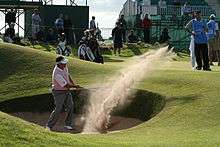
The Open Championship, also known as the British Open, is one of the four major golf tournaments. Other notable golf tournaments in Europe include the BMW PGA Championship, Scottish Open, Irish Open and French Open, which are part of the European Tour.
Europe competes as a single team in the Ryder Cup and Solheim Cup versus the United States, and the Royal Trophy and EurAsia Cup versus Asia. Also, the Seve Trophy was played between the Great Britain and Ireland and the Continental Europe team.
Notable male golfers include Nick Faldo, Colin Montgomerie, Rory McIlroy, Pádraig Harrington, Ian Woosnam, Lee Westwood, Henrik Stenson, Bernhard Langer, Martin Kaymer, Seve Ballesteros, José María Olazábal and Miguel Ángel Jiménez. Notable female golfers include Annika Sörenstam, Laura Davies and Suzann Pettersen.
Tennis
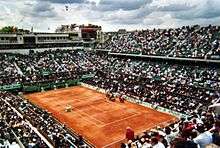
Tennis is popular in most of Europe. Two of the four Grand Slam events are held here: the Roland Garros in France and the Wimbledon Championships in the United Kingdom. The Rome Masters, Madrid Open, Italian Open and Paris Masters have ATP World Tour Masters 1000 events, whereas the Madrid Open and Italian Open are also WTA Tour Tier I events.
Notable male tennis players include Novak Djokovic, Roger Federer, Rafael Nadal, Andy Murray, Stefan Edberg, Boris Becker, Ivan Lendl, Björn Borg and Boris Becker. Notable female tennis players include Maria Sharapova, Monica Seles, Justine Henin, Martina Hingis, Victoria Azarenka, Caroline Wozniacki, Conchita Martínez and Arantxa Sánchez Vicario.
Motorsport
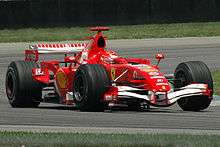
Motorsports are popular across nearly all of Europe. The Formula One, FIA World Endurance Championship, World Touring Car Championship, World Rally Championship and World Rallycross Championship are mainly held in Europe, and are traditionally dominated by European drivers and teams. Notable automobile races include the Monaco Grand Prix, Monte Carlo Rally, 24 Hours of Le Mans, 24 Hours Nürburgring and 24 Hours Spa.
Notable racecar drivers include Jackie Stewart, Alain Prost, Michael Schumacher, Sebastian Vettel, Lewis Hamilton, Jacky Ickx, Derek Bell, Tom Kristensen and Sébastien Loeb.
Motorcycle road racing is very popular in Europe, especially in the United Kingdom, Spain and Italy. Most of the Motorcycle Grand Prix are held in Europe. Italian riders Giacomo Agostini and Valentino Rossi are the two most successful of all time, with eight and seven 500cc / MotoGP World Championships respectively.[2] In the United Kingdom, the Isle of Man TT and other road races held in closed public roads are very popular.
Motorcycle speedway is also popular in Poland, Scandinavia, the Czech Republic and the United Kingdom.
Cycling

Road cycling is especially popular in France, Germany, Spain, Denmark, Italy, Belgium and the Netherlands. Nearly every UCI World Tour race is held in Europe, including the three Grands Tours: Tour de France, Vuelta a España and Giro d'Italia, as well as the five Monuments: Milan–San Remo, Tour of Flanders, Paris–Roubaix, Liège–Bastogne–Liège and Giro di Lombardia.
Notable road cyclists include Jacques Anquetil, Louison Bobet, Bernard Hinault, Alberto Contador, Miguel Indurain, Eddy Merckx, Gino Bartali, Alfredo Binda, Fausto Coppi, and Felice Gimondi.
Other sports
The most prestigious and lucrative athletics and aquatics meets are in Europe. The most prestigious sporting event related to athletics is the European Athletics Championships, wherein Mo Farah is the most successful individual athlete.[3]
For those areas with the proper climate, winter sports are also an important. In Scandinavian and Alpine countries, various forms of skiing and snowboarding are popular. European competitors have traditionally dominated at the Winter Olympics and the International Ski Federation World Championships.[4]
Horse racing is very popular in the United Kingdom and France. Major events are the Royal Ascot, Cheltenham Festival, Epsom Derby, Grand National and Prix de l'Arc de Triomphe.
Traditional sports
Some regions have games that are particular to their home, for example Gaelic games in Ireland, shinty in Scotland, pétanque in southern France, bandy in Russia and Scandinavia, or bullfighting in Spain.
Olympic Games
Europe was the birthplace of the Olympic Movement that has become so central to modern individual sport, with the International Olympic Committee founded in Switzerland in 1894 and Greece being the first country to hold the Olympic Games in 1896. Europe has hosted a total of 30 Olympic Games (16 Summer and 14 Winter), more than any other region in the world.
During the Cold War, the Soviet Union, East Germany and other communist countries had a fierce rivalry in the Olympic Games with West Europe countries and the United States. Notable events include the Blood in the Water match in 1956, the 1972 Olympic Men's Basketball Final, the Miracle on Ice in the 1980 Winter Olympics, and the 1980 and 1984 boycotts.
Club over franchise
Unlike major team sports in North America, where franchises are awarded to nominated cities, most European teams have grown from small clubs formed by groups of individuals before growing rapidly. Churches, universities and work places have often been the most fertile birthplace of many of Europe's major sports clubs, particularly in Britain, which in latter part of the nineteenth century led the way in organised sports.[5]
Clubs therefore had an equal chance to grow to become among the strongest in their particular sport which has led to a situation where many large cities are represented by multiple top class teams in the same sport. In the 2016–17 football season, London has five teams playing in the Premier League, while Liverpool and Manchester also have double representation.
See also
References
- ↑ "Bundesliga pips Premier League to top of average attendance table". Mail Online. Retrieved 2015-10-23.
- ↑ "Valentino Rossi career". Movistar Yamaha MotoGP Official Website. Retrieved 2015-10-23.
- ↑ http://www.bbc.co.uk/sport/0/athletics/28827591
- ↑ "A history of winter olympic medals". latimes.com. Retrieved 2015-10-23.
- ↑ Crego, Robert (2003). Sports and Games of the 18th and 19th Centuries. Greenwood Publishing Group. pp. 43–45.
